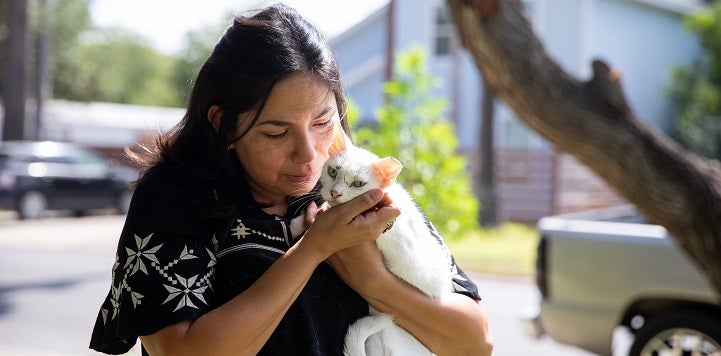
Field Services & Return to Owner
These free educational resources and online courses are geared towards those working in field services in a shelter environment. Topics covered include return to owner, customer service, community-oriented strategies, and more.
![]() ONLINE COURSES
ONLINE COURSES
- A Call-Takers Guide to Fielding Loose Animal Calls During COVID-19- COVID-19 has brought unprecedented changes to the way animal services across the nation are handling non-emergency calls. Shelters and field service departments have cut back, even eliminated, their responses to loose animal calls. This is a necessary step and will support lifesaving efforts; however, it can present challenging conversations with the public when they call to make a report. Call-takers should see this as an opportunity to provide helpful information to citizens and work to resolve their issues by using the resources that already exist within the community.
- Intake Diversion in the Field- As rewarding as it is to place an animal in a new adoptive home, it is even more exciting when we can help keep a pet in its current home and skip the shelter process altogether. Intake diversion does not mean turning people or animals away, but rather thinking outside the box of traditional sheltering and field services to better serve the people and the animals of your community.
- Lifesaving Dispatch- Saving lives over the phone- The call-takers and dispatch staff of the animal welfare industry are often the first point of contact between the community and the shelter. They are also, quite literally, the gatekeepers to animal intake and their successes can have a huge impact on your lifesaving work. It is important that they are well-versed in the organization's mission and policies and are properly trained to ensure the best outcomes for the animals and the people in your community.
- Lifesaving Field Services- Field Services staff are the front line of Animal Services. Officers and staff who are out in the communities which they serve are often the first and only interaction that community has with their Animal Services department. Cultivating a positive and engaging relationship with their community will create more community buy-in and investment in their community’s journey towards saving more lives.
![]() MANUALS & PLAYBOOKS
MANUALS & PLAYBOOKS
- Field Return-to-Owner- Almost since its inception, field operations has operated under the premise that stray animals should be impounded and brought to the shelter in hopes that the animals will be reclaimed, and the owners should be punished with fines for violating the local laws. In recent years, however, there has been a shift to field officers playing a role in the overall lifesaving team by working to reduce intake through various programs, including returning captured stray animals to their owners while still out in the field, rather than bringing them into the shelter system. This playbook is designed to provide an overview of field return-to-owner (F-RTO) programs and help you implement an aggressive F-RTO program at your animal control agency.
- Field-Training Programs- Field-training programs are used to instruct new animal control officers (often referred to as recruits) in the various duties that they will most likely perform during their professional careers. A well-developed and executed field-training program is innovative and proactive. It promotes and develops a recruit’s knowledge of an animal control officer’s duties and skills. It is a critical engagement and educational process that gives recruits the knowledge and guidelines they need to perform competently as an animal control officer in the field. Historically, recruits have been trained by participating in ride-alongs with seasoned officers, which lacks formality in the learning process and does not set them or their agencies up for success.
- Humane Animal Control Manual- In the Humane Animal Control manual, you will find a road map for progressive, community-based animal care and control. Best Friends Animal Society has assembled a collection of descriptions of our country’s most successful lifesaving programs, written by those who helped make them possible. Whether you’re a municipal employee new to this field or a seasoned veteran, we hope that this publication will empower you and your agency to expand the level of service you bring to the people and animals in your community.
- Intake Diversion in the Field- This playbook provides a general understanding of how to implement a robust intake diversion program or enhance an existing program as it pertains to your field service operations. After decades of enforcement-based field operations, animal control agencies across the nation are now transitioning to a community-based approach. Engagement-based field services allow your organization to better serve the animals in your care and offer more effective, lasting solutions to the citizens you serve.
- Lifesaving Dispatch- Field service departments are moving away from outdated and ineffective enforcement-based models and working toward proactive, community-focused operations. With these important ideological shifts occurring in more and more agencies across the country, it is important that dispatch does not get left behind.
- Lifesaving Field Services- Field services should be thought of as the front line of animal services. Often, the first and only interaction that community members have with their animal services department is with officers and staff who are out in the communities they serve. Cultivating a positive relationship with residents will create more community buy-in and investment in your community’s efforts to save more lives.
- Return-to-Owner- This playbook is designed to provide an overview of return-to-owner (RTO) programs and help you implement an aggressive RTO program at your agency. This lifesaving program is instrumental to any agency that receives stray animals, since a primary goal of every shelter should be to reduce the number of animals housed at the facility. By making every effort to identify and notify owners and make the process of reunification easy, agencies can ensure that their limited resources are spent where they are needed most.
You can find additional information on field services and return-to-owner here.